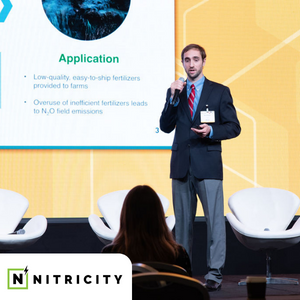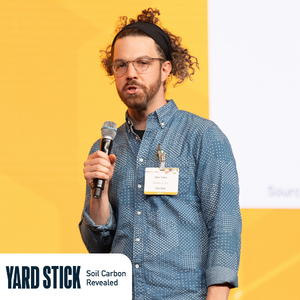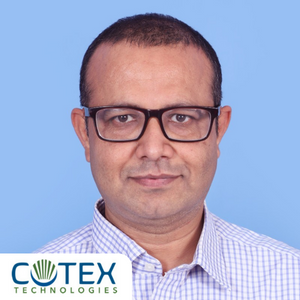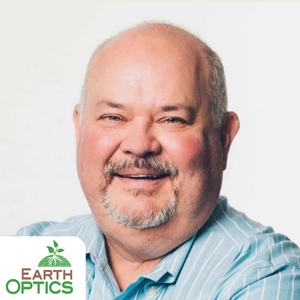Start-up alumni Nitricity, Yardstick, Switch Bioworks, Cotex Technologies and EarthOptics share their progress since their initial pitch at World Agri-Tech, how they’ve navigated business growth in today’s challenging fundraising environment & the lessons they’ve gathered.
 Start-Up Journeys After World Agri-Tech
Start-Up Journeys After World Agri-Tech

Article from | World Agri-Tech Innovation Summit
Tell us about your key milestones since you pitched at World Agri-Tech last year?
 Nicolas Pinkowski, CEO & Co-Founder, NITRICITY: “Olam Food Ingredients reached out to us after seeing Nitricity on stage at World Agri-Tech, and they have proven to be an invaluable partner to us over the last year and a half. Next spring, they will be conducting a field trial with Nitricity’s calcium nitrate fertilizer.
Nicolas Pinkowski, CEO & Co-Founder, NITRICITY: “Olam Food Ingredients reached out to us after seeing Nitricity on stage at World Agri-Tech, and they have proven to be an invaluable partner to us over the last year and a half. Next spring, they will be conducting a field trial with Nitricity’s calcium nitrate fertilizer.
We moved from a San Francisco office to a 20k sq ft manufacturing facility in Fremont, grew from 13 to 26 employees, and raised a $20M Series A. In addition, we recently commissioned our next-generation pilot here in Fremont, which is currently producing calcium nitrate for our field trial with Olam Food Ingredients.”
What advice would you offer start-ups who are fundraising in today’s highly competitive environments?
Nicolas Pinkowski: “Before setting out to fundraise, spend the time researching and defining your go-to-market strategy. This work will inform your product development roadmap, growth strategy, and fundraising timeline. Having a clear, defensible go-to-market strategy will pay dividends down the line when you go to raise any kind of capital.”
What key developments have taken place since you pitched at World Agri-Tech this year?
Tim Schnabel, CEO & Founder, SWITCH BIOWORKS: “We’ve since grown our team by 50% and accelerated our pace of R&D. Rigorous science is still our main priority to ensure we’re developing the best possible products for growers in terms of sustainability and economics.”
Looking back at the activity the past few years, both regarding market dynamics and your company’s internal development, what is driving your strategy?
Tim Schnabel: “We’ve made some amazing progress in developing field relevant genetic control for the next generation of biological products. Programming what genes do, and when they do it will unlock the next wave of performance for biologicals. And we think everything through from “lab to dirt” ensuring that what we build today will fare through the supply chain and seamlessly integrate with existing grower practices.”
What are the main obstacles and challenges you anticipate as you move forward with your start-up? How do you plan to address and overcome them?
Tim Schnabel: “Genetically modified microbes are a new class of products. We are working early on with EPA and USDA to ensure our products are safe and that forward looking regulation becomes adapted to the nuances of engineered microbes – most of it is still focused only on plants.”
How do you view the current fundraising landscape?
Tim Schnabel: “Yes, the funding environment is tough. But our mission of feeding the world sustainably hasn’t lost in importance. Climate change is still here. Food security still matters. Geopolitical conflicts threatening fertilizer supply are only increasing. We’ve made tremendous progress at Switch not just on product development but also on the stellar international team we’ve built. So, we are confident that the right investors will join us long term. There is so much more that we can do!”
How are you engaging with corporates and other partners, what support have you found invaluable?
Tim Schnabel: “We have a lot of inbound interest and are working on several potential relationships. While we believe we can move fastest by staying lean, bringing in the right partners at the right time downstream and upstream will be invaluable.”
 What key milestones and achievements have you experienced this past year?
What key milestones and achievements have you experienced this past year?
Chris Tolles, CEO & Co-Founder, YARD STICK PBC: “Over the past year, our primary successes have been achievements in our research and development performance and advancing the core science of our technology. Over 2023, we’ve been showing our data on our spectral probe to customers and we presented the data at the Soil Science Society of America’s annual meeting in St. Louis. We’ll soon publish in a leading soil science journal. Commercially, we’ve been on many hundreds of thousands of acres, spread relatively evenly across cropping and grazing lands in the US. It’s been great to bring grazing lands online; we’ve expanded our sampling depth to one meter with a prototype spectral probe and adapted our stratification and sample plan design offerings to suit grazing ands too. Our team has grown to 19. Success in both R&D and commercial domains was the basis for our very strong series A this summer led by Toyota Ventures Climate Fund, and other amazing firms like The Nature Conservancy, Microsoft Climate Innovation Fund, Breakthrough Energy Ventures, Lowercarbon, Pillar VC, and others.”
What have been the pivotal “aha” moments that shaped your strategy?
Chris Tolles: “Yard Stick is recognized for facilitating high-quality offsets, but the big ‘aha’ is that our impact extends well beyond offset generation. We provide measurement data, and offsets are one expression of the value of that data. Carbon data matters to lots of different folks, for example, Organic Valley is not selling offsets, yet Organic Valley was investing significantly in soil carbon measurement to address emissions in their agricultural supply. We’re also involved in measuring soil carbon, for the purpose of low carbon intensity fuels, biofuels that have stronger carbon intensity performance than petroleum-based fuels. As evidenced by the six USDA climate smart commodities awards, we received in fall 2022, now expanded to eight, Yard Stick’s capabilities extend well beyond offsetting.”
What are the main obstacles and challenges you anticipate as you move forward?
Chris Tolles: “Soil carbon measurement has lacked accessibility and scale until now. We believe that our technology unlocks demand in this emerging field. You see very high awareness of the opportunity around soil carbon, but very low participation in terms of enrolment in existing programs. Every large agricultural company in the world is trying to understand how they participate in this new soil carbon economy effectively and ensure farmers’ and ranchers’ benefit. Sorting through these many options will take time!”
What strategies can you share for successfully raising funds?
Chris Tolles: “Commercial traction is everything. We’re a real business now, and no longer just a science experiment – that’s essential for any investor to see, doubly so in difficult fundraising climates.”
How are you engaging with corporates and other partners, what support have you found invaluable?
Chris Tolles: “Our customers are corporations, not individual farmers or ranchers. We provide measurement services to companies who themselves enrol farmers, for example in emission reduction projects, whereby soil carbon measurement is a crucial component of the overall climate footprint analysis. We sell our services to any agricultural or global food brand who is thinking about soil carbon. For example, if General Mills is hiring Yard Stick, it’s because they are encouraging their oat farmers to adopt regenerative practices, and they need data to understand soil carbon outcomes which inform their ability to make claims. Yard Stick conducts measurement services on a given farmer’s land, however, its General Mills who is our direct paying customer for these services.”
Cotex won the Nutrien Innovation Challenge in 2021, and announced a partnership with Nutrien this November 2023. What has happened since?

Santosh Yadav, Founder & CEO, COTEX TECHNOLOGIES: “The World Agri-Tech innovation challenge helped us get more visibility and secure investors. Since then, we have made great progress, and I am happy to inform you that we have scaled up the technology to a commercial scale and are ready for full commercialization of biodegradable coated fertilizer products. We are planning to launch our CRF products by spring 2024 both in broad acreage and specialty crops in the North American market.”
Looking back on you your company’s internal development, what have been the biggest challenges you have encountered?
Santosh Yadav: “During the development we found out that the biodegradable coating was easy to apply but difficult to predict the performance of the product in the soil so we focussed our efforts more on developing a polymer coated product that can effectively provide season-long nutrition with a single application without compromising the integrity of the biodegradable coating. The biggest challenge was to simultaneously develop the coating process and the coating itself and many times one will work but the other will not so we had to change our approach several times before we finally found a process which could be scaled up to the commercial scale that can produce commercial quantity products with a consistent quality.”
What are the main obstacles you anticipate moving forward?
Santosh Yadav: “The investment climate has become more challenging and we are now focused on generating revenues and becoming profitable. We have enough production capacity that can meet the demand for 1-2 years without spending on capex and we continue to do field testing of our products on different crops. We are also trying to raise a seed round in 6 months for further growth.”
What insights and strategies would you share for start-ups raising funds?
Santosh Yadav: “My advice to startups raising funds in this climate would be to get traction in terms of commercial viability of the venture. It is very critical for any startup to get to monetization as soon as possible to attract further rounds of funding now.”
 What’s happened for EarthOptics since you won the AGCO Innovation Challenge at World Agri-Tech in 2021?
What’s happened for EarthOptics since you won the AGCO Innovation Challenge at World Agri-Tech in 2021?
Todd Martin, Founder & Chief Commercial Officer, EARTHOPTICS: “Winning the AGCO Challenge was instrumental to our growth. It literally ‘put EarthOptics on the map’. The positive exposure from the challenge accelerated our growth.
At the time of the challenge, we had 5 people on staff, one product, (TillMapper), and one real customer with 20,000 acres. We had a target of measuring carbon to introduce a new product, C-Mapper. This endeavor took a huge lift from whole team to make it happen (prove the methodology), and a further push leading up to the deadline. It’s a great internal story of everyone pulling together to make C-Mapper a reality.
EarthOptics is now approaching 100 employees. We have just passed 1,000,000 unique acres measured and mapped. We’re now measuring and mapping over 100,000 acres a month. Farmers and ranchers using our measurements and maps are now making more sustainable and profitable choices.”
Looking back, what pivotal moments have shaped your strategy?
Todd Martin: “The ‘aha’ realization for us at EarthOptics was that measurement is customer agnostic. That knowledge alone has enabled us to move through agriculture from farmers and ranchers to Consumer Product Companies and finally to the consumer.”
What are the main obstacles and challenges you anticipate as you move forward with your start-up? How do you plan to address and overcome them?
Todd Martin: “Agriculture is a unique industry. For people from outside the space, we relate agriculture to a high-tech factory. In this way we can illustrate the complexity of running a factory floor across 400 million acres of working lands, dealing not only with weather and pests, but also animals and wildlife. Farmers and Ranchers are used to that level of complexity. But through this illustration, you can immediately see the obstacles. We are meeting these challenges by developing a strong service provider network with local knowledge. This enables our expansion and reduces the complexity with local expertise.”
How are you engaging with corporates and other partners, what support have you found invaluable
Todd Martin: “EarthOptics is proud and grateful to have an experienced and thoughtful network of investors and corporate partners. Our investor/customers have leaned in, not only with invested dollars, but with projects and work to move the future of agriculture and soil data to make real sustainable change. They are enabling us to move faster and make a real difference with measurable and actional results in agriculture.
We work with our corporate partners to match their needs, whether through measurement only or broader project management to make their projects successful.”
World Agri-Tech San Francisco has hosted 200+ start-ups, serving as a pivotal launchpad for companies entering commercialization. If you have a game-changing idea and are seeking investment or new partners, reach out about participating in our Start-Up Arena—an unmissable opportunity! Get in touch via email for a chat.
The content & opinions in this article are the author’s and do not necessarily represent the views of AgriTechTomorrow
Comments (0)
This post does not have any comments. Be the first to leave a comment below.
Featured Product


 What key milestones and achievements have you experienced this past year?
What key milestones and achievements have you experienced this past year? 
 What’s happened for EarthOptics since you won the AGCO Innovation Challenge at World Agri-Tech in 2021?
What’s happened for EarthOptics since you won the AGCO Innovation Challenge at World Agri-Tech in 2021?